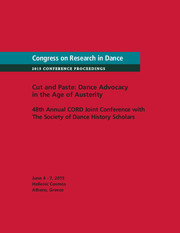No CrossRef data available.
Article contents
After Looking North and West: Portuguese Contemporary Dance and the European Crises
Published online by Cambridge University Press: 02 August 2016
Abstract
In the four decades that followed the April 1974 revolution, which ended the Estado Novo's dictatorship (1926–1974) and the Portuguese colonial empire, contemporary theater dance has witnessed an explosion in Portugal. After 1974, the African decolonization, the subsequent flow of immigrants, European Union accession (1986), and the opening to the contemporary Western world have substantially altered Portugal's political and demographic landscapes, social practices, and expressive cultures. Considering the current European crises, this article discusses how Portuguese contemporary dance is recently facing or reflecting the impact of Lusophone postcolonial cultural and demographic reconfigurations, and incorporating or dealing with its patrimonial expressive cultures.
- Type
- Research Article
- Information
- Copyright
- Copyright © Luísa Roubaud 2016


